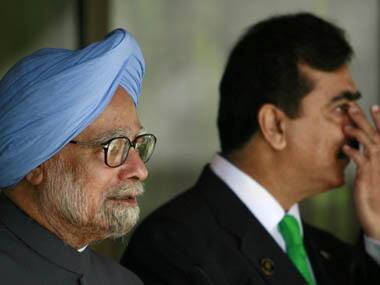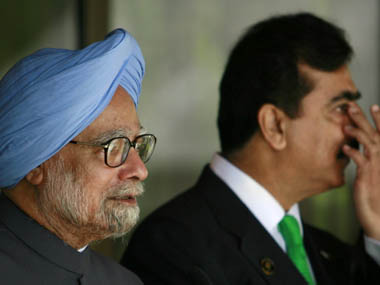Meeting on the sidelines of the Nuclear Security Summit in Seoul on Tuesday, Pakistan Prime Minister Yusuf Raza Gilani had two requests to make of Prime Minister Manmohan Singh. The first was for supply of power from Punjab to Pakistan to tide over its severe power shortage,
which has had people rioting on the streets
. Manmohan Singh evidently promised to consider it, although it’s laughable for India to be seen to be exporting electricity when its own key cities suffer power outages of up to eight hours. The second request from Gilani was for Manmohan Singh to visit Pakistan. The two Prime Ministers, both artful survivors in the power balancing game, are part of a mutual admiration society: each considers the other “a man of peace” (
here
and
here
). Yet for both of them, their political standing in their respective country is on fairly slippery ground. So it was perhaps with the sense that time was running out for both of them that Gilani invited the peacenik Singh. On this, however, Manmohan Singh was a little less than forthcoming. His heart, he told Gilani, was set on visiting Pakistan, but it must await an occasion when “something solid” was achieved in terms of advancing bilateral relations on the various areas that are under discussion. [caption id=“attachment_258519” align=“alignleft” width=“380” caption=“The two Prime Ministers, both artful survivors in the power balancing game, are part of a mutual admiration society: each considers the other “a man of peace”. Reuters”]
 [/caption] Manmohan Singh was perhaps just being prudent in postponing his travel plans until more propitious circumstances. But that prudence may also be the outcome of his own experience of dealing with Pakistan in the past, when in his eagerness to make it up to our northern neighbour, he ended up tripping up on the red carpet. On the face of it, there are of course compelling reasons for both countries to end the cussed overhang of 60-plus years of animosity: both have serious developmental challenges, and can ill-afford the rank pettiness and the meaningless diversion of resources away from development, that has thus far characterised what passes for bilateral relations. Yet, from an Indian perspective, while there may be merit in giving peace a chance with Pakistan, such an accommodation must await a more meaningful demonstration of Pakistan’s bonafides. It’s worth bearing in mind that it was only a little over than three years ago that sea-borne terrorists from Pakistan came ashore in Mumbai and waged urban war. For a long while, the ISI-military establishment was in complete denial over its culpability in that crime, and even today grooms terrorist groups that it can use as a proxy army in its covetous lust for Kashmir. Track 2 activists in both countries today gush about the
wisdom of “forgiving and forgetting” the past
, and there’s nothing wrong in that. Peace is certainly a dream worth nurturing. Yet, so long as terrorist camps continue to operate in Pakistan and terrorist leaders enjoy ISI-military patronage, it’s hard to dismiss perfidy as being confined to Pakistan’s past. The truth of the matter is that not rushing into peacenik overtures with Pakistan has, if anything, worked out to India’s advantage. In recent years, more and more countries have woken up to the reality of Pakistan’s role as the epicentre of global terror, which is today the country’s biggest export industry. Where once busybody US legislators backed Pakistan’s campaign against Kashmir, they are today more aware of its dangerous role in fomenting jihadi violence. The boot is on the other foot:
it is the separatist movement in Balochistan that gets more traction
. On the chessboard of strategic moves, Pakistan has been forced to play defence. Its Kashmir dream has been shattered. If anything, it is Pakistan’s own unity that is at risk. Yet, even today, the ISI-military continues to hold back the Pakistani civilian administration from making even the feeblest overture towards India. The manner in which they put a spanner in the works after the civilian administration announced its decision to grant reciprocal Most Favoured Nation trade status to India reflected cussedness of a high order. It’s of course heartening to see the civilian administration in Pakistan fight to take back ground it had lost to the ISI and the military, but that battle is far from being decisively won. That is the reality of Pakistan that would be folly for us to ignore. Peace is certainly desirable, but there is a case for waiting for an optimal moment for that objective to be met. There are many more milestones to be crossed on that road. And peace, when it is achieved on our terms, will be worth savouring all the more.
[/caption] Manmohan Singh was perhaps just being prudent in postponing his travel plans until more propitious circumstances. But that prudence may also be the outcome of his own experience of dealing with Pakistan in the past, when in his eagerness to make it up to our northern neighbour, he ended up tripping up on the red carpet. On the face of it, there are of course compelling reasons for both countries to end the cussed overhang of 60-plus years of animosity: both have serious developmental challenges, and can ill-afford the rank pettiness and the meaningless diversion of resources away from development, that has thus far characterised what passes for bilateral relations. Yet, from an Indian perspective, while there may be merit in giving peace a chance with Pakistan, such an accommodation must await a more meaningful demonstration of Pakistan’s bonafides. It’s worth bearing in mind that it was only a little over than three years ago that sea-borne terrorists from Pakistan came ashore in Mumbai and waged urban war. For a long while, the ISI-military establishment was in complete denial over its culpability in that crime, and even today grooms terrorist groups that it can use as a proxy army in its covetous lust for Kashmir. Track 2 activists in both countries today gush about the
wisdom of “forgiving and forgetting” the past
, and there’s nothing wrong in that. Peace is certainly a dream worth nurturing. Yet, so long as terrorist camps continue to operate in Pakistan and terrorist leaders enjoy ISI-military patronage, it’s hard to dismiss perfidy as being confined to Pakistan’s past. The truth of the matter is that not rushing into peacenik overtures with Pakistan has, if anything, worked out to India’s advantage. In recent years, more and more countries have woken up to the reality of Pakistan’s role as the epicentre of global terror, which is today the country’s biggest export industry. Where once busybody US legislators backed Pakistan’s campaign against Kashmir, they are today more aware of its dangerous role in fomenting jihadi violence. The boot is on the other foot:
it is the separatist movement in Balochistan that gets more traction
. On the chessboard of strategic moves, Pakistan has been forced to play defence. Its Kashmir dream has been shattered. If anything, it is Pakistan’s own unity that is at risk. Yet, even today, the ISI-military continues to hold back the Pakistani civilian administration from making even the feeblest overture towards India. The manner in which they put a spanner in the works after the civilian administration announced its decision to grant reciprocal Most Favoured Nation trade status to India reflected cussedness of a high order. It’s of course heartening to see the civilian administration in Pakistan fight to take back ground it had lost to the ISI and the military, but that battle is far from being decisively won. That is the reality of Pakistan that would be folly for us to ignore. Peace is certainly desirable, but there is a case for waiting for an optimal moment for that objective to be met. There are many more milestones to be crossed on that road. And peace, when it is achieved on our terms, will be worth savouring all the more.
Venky Vembu attained his first Fifteen Minutes of Fame in 1984, on the threshold of his career, when paparazzi pictures of him with Maneka Gandhi were splashed in the world media under the mischievous tag ‘International Affairs’. But that’s a story he’s saving up for his memoirs… Over 25 years, Venky worked in The Indian Express, Frontline newsmagazine, Outlook Money and DNA, before joining FirstPost ahead of its launch. Additionally, he has been published, at various times, in, among other publications, The Times of India, Hindustan Times, Outlook, and Outlook Traveller.
)